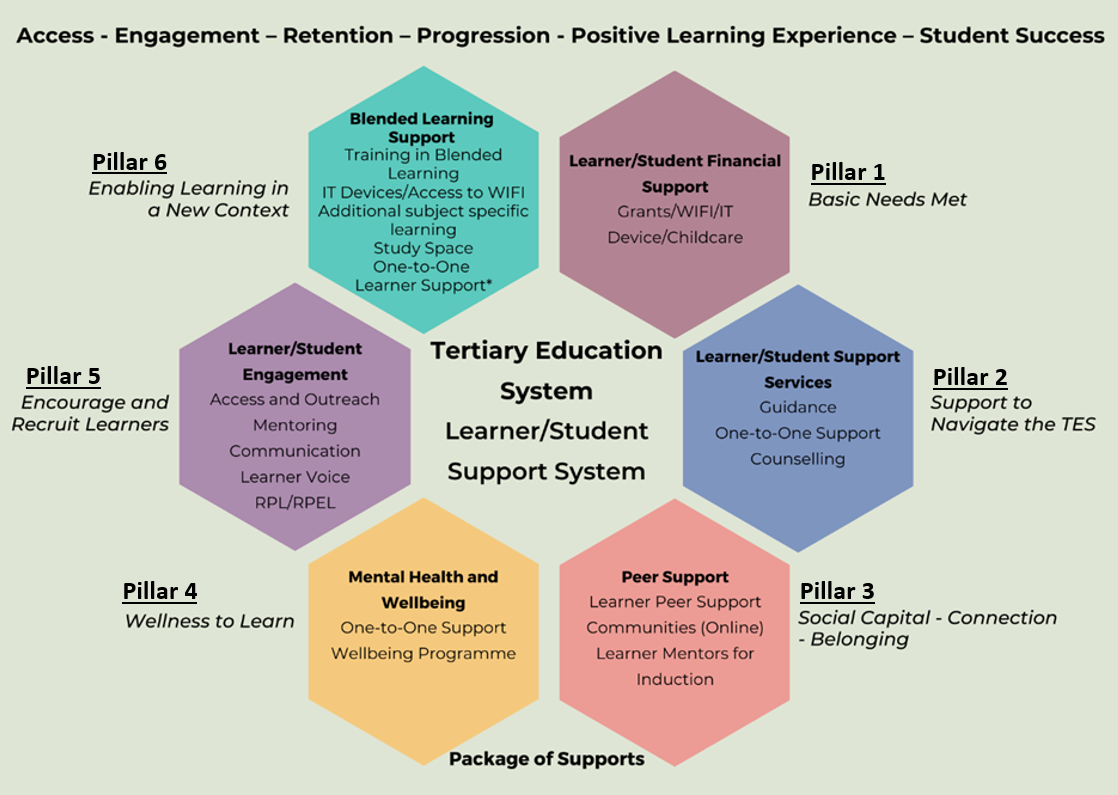Mitigating Educational Disadvantage Working Group
At the onset of the pandemic, in March, the Department of Education and Skills quickly established a set of groups to support the continuity of FET, HE, and community education provision through the COVID-19 crisis via the Tertiary Education System (TES) Steering Group. As part of this structure, AONTAS was tasked with establishing and chairing the Mitigating Educational Disadvantage (including community education issues) Working Group (MED). The group comprised representatives across the tertiary education system totalling 31 members with 23 agencies represented in addition to academic experts (Prof Tom Collins, Dr Fergal Finnegan and Dr Michael Hallissy) which identified issues impacting on vulnerable learners and offered high level solutions. Over the course of 21 meetings, the bulk of which were held twice weekly in March and April, ten papers were produced: Digital Learning, Assessment, Learner Engagement, Community Education, Educational Equity and Learner Cohort, Tutors and Practitioners, Financial Barriers and Mental Health, Progression and Barriers in the Return to Remote Learning. The set of papers scoped out key issues in the short-term and proposed recommendations, many of which were supported in the July Stimulus package, Budget 2021 and the Mitigating Against Educational Disadvantage Fund aimed at community education providers.
In taking a tertiary-wide approach to addressing educational disadvantage, high level themes related to access were identified, resulting in a Tertiary Education Student/Learner Support Framework that brought together six key overarching pillars impacting on access, whilst allowing for appropriate sectoral responses. Recognising the complexity of access issues, and persistent structural marginalisation of learners, a commitment to medium and longer-term monitoring of the impact of COVID-19 necessitates the collation of learner-informed, qualitative and quantitative research on disadvantaged learners and proposing methods to mitigate the impact is essential.
Innovation for evidence-informed policy making and educational access
In closing the group, there was broad agreement that the new Department of Further and Higher Education, Research, Innovation and Science, under the leadership of Minister Harris TD, has an opportunity to make headway in its quest to further its social inclusion agenda. It can achieve this by building on the work of the MED, as a unique structure that focuses on educationally disadvantaged learners, through a holistic, learner-centred, rights-based approach. This cross-sectoral approach, drawing on the expertise of community education organisations, FET providers and bodies, higher education institutions, civil society organisations, learners and additional experts would offer a coherent structure drawing together the knowledge, experience and evidence to inform the Department’s access policy priorities. Despite the significant investment in learner supports, emerging data signals a significant reduction in access and participation by disadvantaged learners at the early levels of the National Framework of Qualifications, which in turn will have a knock-on effect across the tertiary system. However, with the Minister and DFHERIS’ commitment to educational equality, by drawing on our collective efforts as a community of stakeholders dedicated to access it is a critical moment to make significant, systemic inroads in making education for all a reality.
Tertiary Education Student/Learner Support Framework – See www.aontas.com/assets/resources/Submissions/Pre-Budget%20Submission%202021_12%20FINAL.pdf
Dr Niamh O’Reilly, CEO, AONTAS
The ten papers were developed in collaboration with the MED group by Dr Eve Cobain, Dr Leah Dowdall, Dearbháil Lawless and Dr Niamh O’Reilly.





